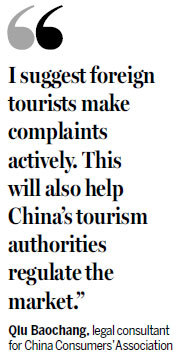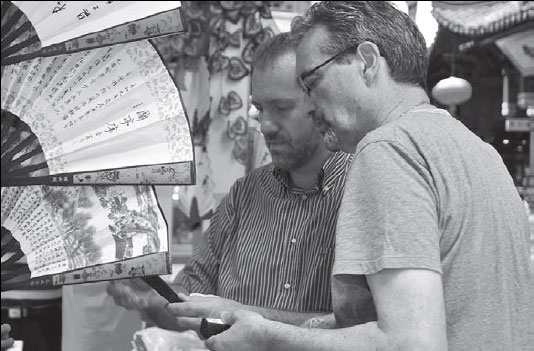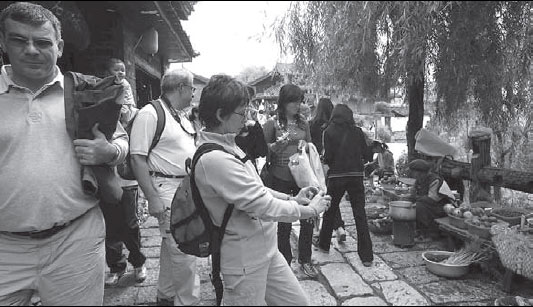Coercive practices contravene tourism law
|
Foreign tourists browse souvenirs at a scenic spot in Shanghai. Zhou Dongchao / For China Daily |
|
Overseas travelers who come to China expect a regulated tourism market and better service from tour operators. Lu Zhongqiu / China Daily |
Donald Guadagni, 55, from the "Green Mountain" State of Vermont in the United States, still remembers his five-day trip to Guilin during the Spring Festival holiday in 2012.
The city that is famed for its natural beauty is located in South China's Guangxi Zhuang autonomous region.
Guadagni booked a private tour package, hoping to get superior service. However, he found that time was taken from leisure activities for shopping at "museums".
"There were some places they called 'museums', such as a tea museum, silk museum and glass museums, but some of the museums were actually businesses," said Guadagni, who teaches at Taizhou University and Ningbo City College of Vocational Technology in Zhejiang province.
Those museums all have expensive gift shops attached and Guadagni was expected to spend money. He understood the shopping traps immediately because of similar experiences he had in South Korea. He also noticed that many Chinese tourists were kept at some places until they spent enough money.
Even though Guadagni was not forced to shop, he was not happy with the arrangement.
"I didn't tip the tour guide because they wasted my time," he said. "Some foreign tourists couldn't tell the traps and some of them are naive and polite, so they buy something - cosmetics, teas, silks, jewelry."
Qiu Baochang, a legal consultant for the China Consumers' Association, said forced-shopping disputes often happen in the tourism industry and many foreign visitors don't realize that Chinese law also protects their rights.
According to China's Tourism Law, foreign tourists have the right to know the details of the tourist products and services they purchase.

They also have the right to refuse coercive trade behavior. Tourists are entitled to select tourism products and services independently and to refuse attempts at coercion by tourism operators.
"Many shops and travel agencies just take advantage of foreign tourists because tourists are not familiar with the situation and don't know how to file a complaint due to culture and language barriers," Qiu said. "I suggest foreign tourists make complaints actively. This will also help China's tourism authorities regulate the market."
Yu Liangbing, China CYTS Tours' deputy general manager of inbound tourism, said such disputes happen mostly to travelers who plan their own trips and could happen in any country.
"Group travelers could solve most of the problems with the tour guide and travel agency. In the past, many foreign tourists complained that they have trouble understanding local laws and regulations. Our tour guides all help clarify the situation for them," Yu said.
Qiu added that unfamiliarity with Chinese laws and regulations could lead to unpleasant experiences in China.
Guadagni suggested that tour groups and travel agencies provide such information to tourists as a brochure or leaflet.
"In my opinion, I think the government should advise tourists about what acceptable practice is and how to file a complaint if something isn't right," he said. "Tours should also tell you whether there will be any activity that is purchase-oriented."
"Forcing any tourist to buy something harms the tourist trade in any country - we spend money for the trip and that should be enough."
suzhou@chinadaily.com.cn
(China Daily 12/01/2015 page5)
















